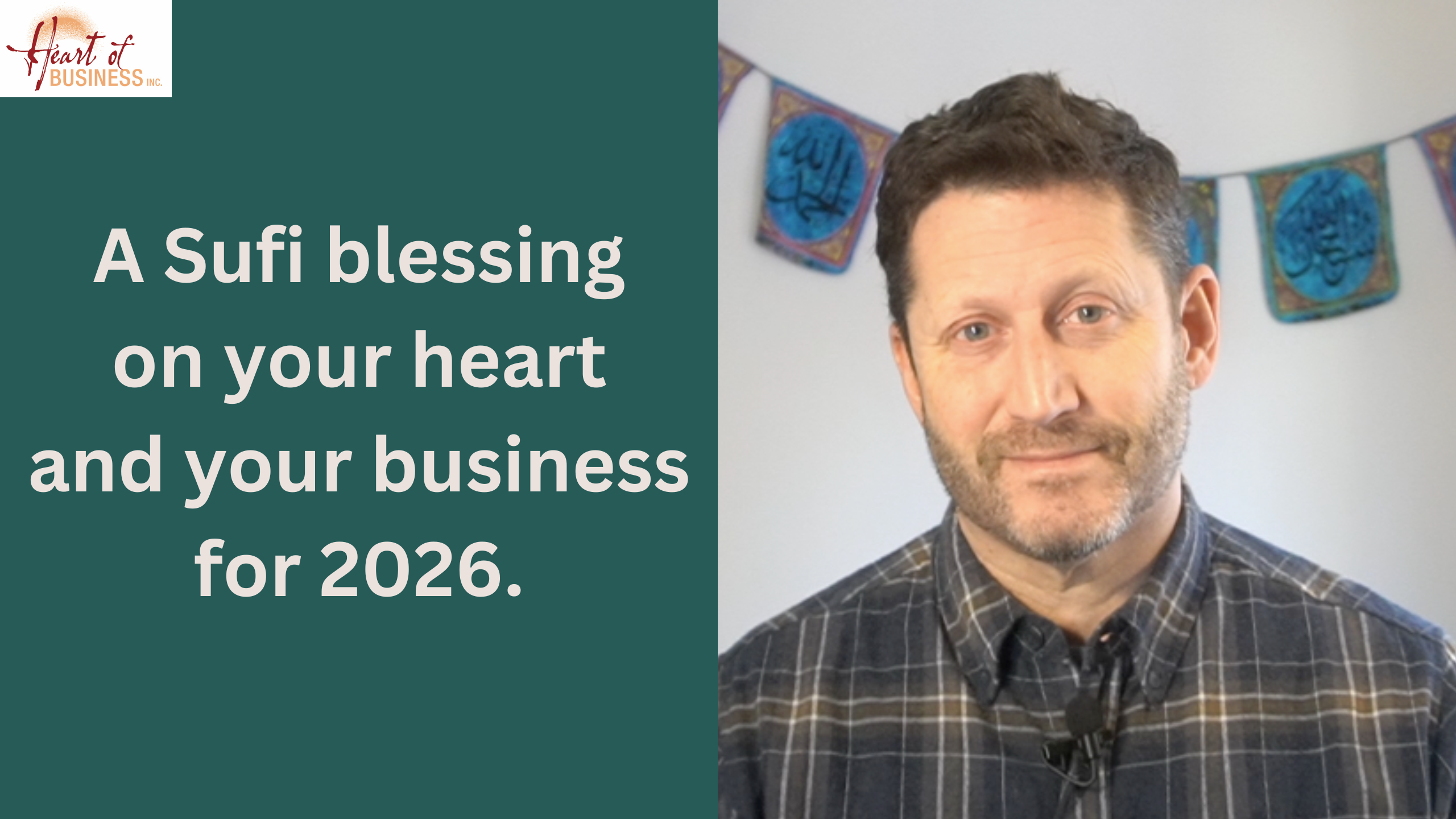 When clients leave it can be so painful and heart-wrenching. What went wrong? Was it something I said? How could I have messed up so badly?
When clients leave it can be so painful and heart-wrenching. What went wrong? Was it something I said? How could I have messed up so badly?
That’s just one side of it. The other side is defensive. “Let’em go. Room for more. Didn’t need ’em anyhow.”
You don’t want to beat yourself up, nor do you want to wall your heart off and just turn your back when a client leaves. You need to have The Conversation.
The Exit Conversation
The conversation starts off with one extremely important statement, and it needs to come from your heart.
“I’m very sad to see you go AND I’m inspired you were able to get clear about what you really need.”
It’s hard to quit an agreement. You need to support the clarity they’ve reached.
Express both your sadness and your support for their choice with sincerity and an undefended heart, and the next part of the conversation will become extremely valuable.
Now Ask The First Question
“Can you tell me about what happened for you?” What was their experience? How do they feel? You’re trying to learn for yourself what went wrong, and you are also wanting them to feel witnessed.
Most companies don’t care if a customer is unhappy. The most you’ll get talking to a “customer service representative” (what kind of title is that?) is a mechanical “I’m sorry you weren’t satisfied” that feels worse than if they hadn’t said anything.
Witness them, and both your heart and theirs will feel lighter.
Then Ask the Second Question
“What could I have done differently?” What would they fix or change? How would they want to see the issue prevented?
First they get witnessed and now they actually get to voice their opinion of how to do it better? If you were the client, just take a moment to imagine how that might feel.
Sweet, eh? They’ll love you for it.
Don’t criticize or shoot down their suggestions. Just open your heart, listen, and take notes.
You will get a lot of very interesting ideas, and some not so. Some will be actual suggestions you can put to use, others may not be practical to implement. Either way, you are getting some valuable input for how clients are experiencing your business.
And here’s the great news: what they actually say will usually be far better than what you were imagining. When I’ve held exit conversations, I’ve heard:
- “Don’t do anything different. I just had an epiphany about what I really needed, and I don’t think I could have figured it out without trying this out.” (This feedback actually helped us get more clear about the must-ask questions in our enrollment conversations.)
- “I would make this change to your sales materials, so this aspect of the program would be more clear.” (Which prompted us to make many changes to our sales pages, highlighting what needed to be clear.)
- “I needed more personal attention.” (Which prompted a conversation about other services, where the client shifted from one program to another.)
Prepare to be surprised at how gentle the conversation can be, even if someone is upset.
Now The Last Question
“What do you need to feel complete?”
You can ask this in different ways, but you want the exit to be a real exit, with true completion. They may want a partial refund, they may want nothing. You’ll never know if you don’t ask.
There’s no need to automatically give them what they ask for. It needs to feel good to both of you. Again, you may be surprised at how little people ask for.
Knowing you are going to ask this question, decide ahead of time what you are willing to give them. This will allow you to not have to think on the spot during an emotionally charged moment.
More importantly, if you are asked for more than feels good to give, instead of just saying “No” (or worse, “Yes” going against your heart), you can say:
“I hear you! Instead of a full refund, I am willing to return 65%. We both put in a lot of work, and it feels fair to account for that.”
Preparing Your Tender Heart For the Conversation
If you aren’t comfortable with hearing criticism or constructive feedback, I suggest you prepare for the conversation in three ways.
- Take some time to remember all the good you’ve done, the positive feedback you’ve received from other clients. Once when a client had a very unhappy client herself, I had her total up her clients from the last year, and put them in columns of “Very happy” “happy” and “not happy.” Seeing that nearly all of them landed in “very happy” kept her from feeling devastated by this very rare unhappy client.
- Have someone in your support circle available right after the conversation. Someone to hear how the call went, who can give you empathy and encouragement in the face of what you heard.
- Spend time in Remembrance or other heart-based spiritual practice, and ask your heart, “Is love available even here.” Sinking deeper into the stillness and beauty you know is available to you under the chaotic waves of life.
These conversations are not the most fun, but they happen. If handled well, they can improve your business tremendously.
Have you had these conversations? What was your most valuable or surprising exit conversation? Tell us about it or ask questions about where you are challenged.
p.s. Needing some hands-on help?
With some clients recently completing, all three of us, as it turns out, have client spots open. Jason and Yollana are both amazing and fabulous official Heart of Business practitioners with a ton of experience and fantastic client results to show. If you are drawn to either of them, set up a conversation with one of them.
http://heartofbusiness.com/training-programs/obd-program-basic/
The last few years a great deal of my time has been taken my in creating and running a team. I’ve led big classes, facilitated live seminars, managed the growth and care of our business. And I’ve had very few spaces for individual clients.
That’s shifting. If you find yourself moving into thought leadership, perhaps on the brink of real growth, and need to combine the power of profound spiritual surrender with advanced tactics and strategies, let’s talk. Take a look and let’s set up a conversation.







20 Responses
Hey Mark
Thank you for such a concise article. I love the precision of your writing.
And my response to this weeks Business Heart comes first from your opening paragraphs prior to this article.
A year or so back I visited a Sufi mosque in downtown Bristol, England – where I live – simply to experience for myself the reality of Muslim life as it is lived in our local community. To be clear, I’ve loved the Sufi poets for many years and have visited mosques in Jerusalem and other parts of the Holy Land – but had not had anything to do with Islamic life in the UK. So, because I am incurably curious, along I trotted …
Once inside the mosque, which is a simple and quite humble converted school building rather than one of the immensely beautiful and ornate purpose-built mosques, I found myself the only white guy in a sea of Pakistani men engaged in prostrating prayer.
This could have been a bit intimidating if it were not that four of these men took it upon themselves to come and sit with me – I was not allowed to join in with the prayers as this was my first visit – explaining what was happening and making me feel warmly welcome.
When the prayers were complete I was invited to sit in a smaller group and ask all the questions I wanted to about Islam. Every question was answered so clearly and without evangelism that I even took my heart in my hands and addressed the issue of jihad and holy war, half expecting the conversation to end there.
Instead I learned that jihad means “struggle with ego” and holy war is truly the war with the temptations of ego. They told me that the so-called Islamic terrorists are not true Muslims at all but people who take what they want from the Koran and twist the words to mean what they want them to mean.
I did my best to engage with the Sufi chants but foreign languages are not my strong suit and Arabic not known to me at all. I did my best to enter into the spirit of the singing, although rather badly I fear.
However, in spite of my linguistic and musical limitations, something was transmitted that was more than just the philosophy behind the words we sang and the teachings that had been offered me, more than just the surface appearance of things. Something in that meeting had a life of its own that went beyond our humanity and yet included our humanity at the most intimate level.
I came out of that mosque glowing with a palpable feeling of Love for everyone, all races, all religions, even the drug dealers, thieves, and whores who inhabit the neighbourhood in which the mosque is located.
And yet I had understood not one word of the chants and had simply had an apparently ordinary conversation with those devotees of the Beloved.
All this came to me because of your opening words about allowing the tools, the chanting and inquiry, to do the “heavy lifting”. I feel that what occurred that day was simply due to my entering into dialogue with an open heart, a clear non-judgmental mind, and a willingness to embrace my fellow men.
And to link this to your article, when a client leaves perhaps most of all – beyond and yet including the excellent questions you offer us – all we need do is open our heart to the Divine that lives as the essence of each one of us.
Perhaps above all should simply trust that all will be well as our journeys through this mystery of life continue to unfold and intertwine in ways we can never fully understand.
with kindness,
Leo
@Leo – What a beautiful story! I’m so grateful to read that. It’s a little random, because you could also walk into a mosque that was much more rigid and fundamentalist in nature, which wouldn’t be nearly as fun an experience- but you didn’t, you walked into one based in love and how inspiring!
Why the assumption that something went wrong? Sometimes clients leave because they got exactly what they wanted. The questions are important for that scenario as well, and completion is always important.
@Susan- It’s very true. And perhaps I wasn’t as clear as I wanted to be. I’m talking about the situation when a client says, “This isn’t working for me, I’m done and leaving.” And yes, the questions do apply even when things end well. 🙂
hi mark~and thank you to susan for invoking a bit of clarity. what struck me about this particular article is, it seems to point to those doing a particular kind of work.
in the work i do, if a person says they’re done and it’s not working for them, i champion them for knowing that, for being assertive enough to not keep hammering away @ something that clearly is not working. in past situations the few times when it’s obvious things are not working, i’ve been the one to inquiry as to the efficacy of what we’re doing together. it’s actually been me that has referred people elsewhere.
it never has occurred to me that someone’s departure requires that much soul searching. maybe b/c it has never happened! (>:)
then again, my view is different perhaps the one from which this article is written. if i’m really doing my job, so to speak, then people do not feel they have to stay on any longer than they deem necessary. it isn’t for me to decide, you know? i want them to feel empowered and get on with living life.
and i respect that perhaps that is not the view from which you were writing.
Meg- I absolutely agree with you- that is a very enlightened view to take, and I love to live in that place. The article was written in empathy with folks who maybe don’t have a full business yet, or are feeling tender about themselves, and when someone leaves it shakes them up.
What a pertinent article, Mark! Just where I am with a couple fo clients – and now I have the encouraging guidance to see inside me, find what’s going on and perhaps find what’s going on for them.
And Leo’s experience brought tears to my eyes. Wonderful to be so warmly welcomed in a foreign world. I’ve experienced that in one church near me and it’s so reassuring.
Blessings,
Bevi
Bevianne- So glad it was so timely! And yes, Leo’s story was amazing…
I needed this – We are raising our rates, and I am the person who gets to tell our clients. My first task is to be 100% on board with what we are doing (I’m scared we will lose too many clients) then I have to tell every single one of them on the phone (over 250) by the end of May!
Of course, I thought of going to the materials I have from Mark, but this just came on my Facebook at just the right time —Thanks, Mark
Caroline- what a job! And 250 clients! Be kind to your heart…
Mark,
I greatly appreciate your road map for this situation – I gained a lot from it! This situation has come up for me and I appreciate your gentle suggestions to not be so afraid of what could be a fruitful and helpful conversation.
As always, thank you for your guidance.
Warmly, Karly
Hi Mark
I appreciate this article. It’s helping me to realise that I have a client who has drifted away and that I really need an answer to the question “are you ready to complete our work together?”
Warmly
Dorothy
This article reflects the truth side while we handle the client. I have faced same problems for several times. Nice article.
This is some really good advice. It’s so difficult to not immediately become defensive when a client tells you that you aren’t giving them what they need. Because most of the time the feeling on your side is that it was happening because they weren’t sharing the information with you necessary for you to deliver to their expectations.
Not burning bridges when a client leaves is so vital. Especially today when it’s easy to leave a review somewhere highly visible. Staying cool and asking the questions you suggest is a great way to keep from blowing up. Appreciate it!
Dear Mark,
Your point of view is 100% correct, I am from India and the problem with the business is the same as we have so tough competition. but ya the customer / client is the God and we have to do everything for their satisfaction. you points will really help me a lot. thanks once again
1st of all, great blog!This is some really good advice,I appreciate this article!! thnx for the post!
Great article and a wonderful heartfelt blog. Thank you. The article came at a time that I’ve been intentionally holding the readiness to have this conversation with a contracted agency.
I have wanted to be sure I could be open and fully present when the time came. I’m ready now and the questions are just perfect, phrased in a way that allows for conversation and honesty.
With Gratitude,
Sheri
Thanks for sharing this. This is something that i will be truly be using in the future.
Its important to understand why a client quits and than how to build upon making your services or products better 🙂
Losing a client isn’t very fun at all, but I have now a better understanding of what might be the higher road to take in such an instance… Thanks for sharing your insights and allowing me to make my future business that much better!
Well. I just used these three questions with a client who completed with me. I was amazed by her responses. Very positive responses to #1. #2 (What could I have done differently?)